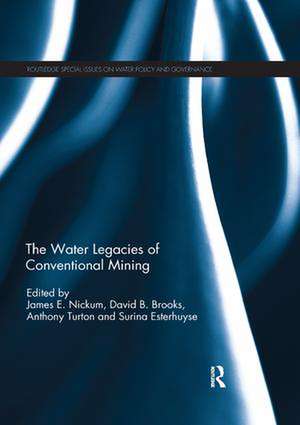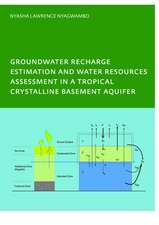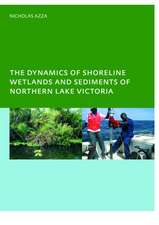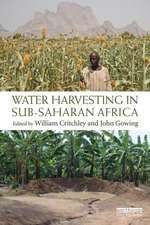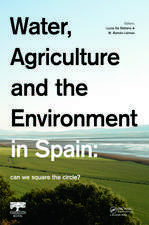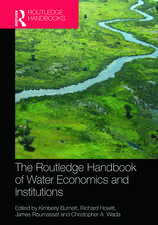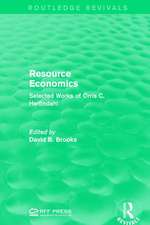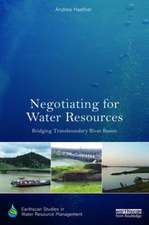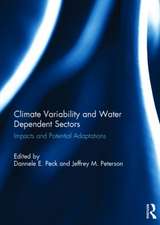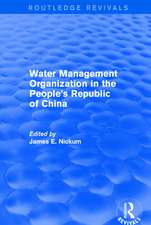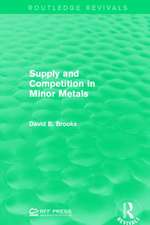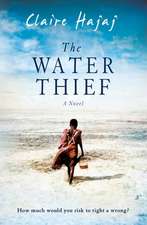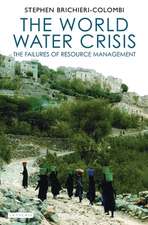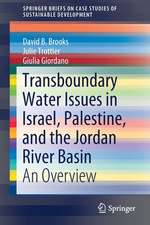The Water Legacies of Conventional Mining: Routledge Special Issues on Water Policy and Governance
Editat de James E. Nickum, David B. Brooks, Anthony Turton, Surina Esterhuyseen Limba Engleză Paperback – 17 ian 2019
The chapters in this book were originally published in the journal Water International.
| Toate formatele și edițiile | Preț | Express |
|---|---|---|
| Paperback (1) | 416.22 lei 6-8 săpt. | |
| Taylor & Francis – 17 ian 2019 | 416.22 lei 6-8 săpt. | |
| Hardback (1) | 1000.27 lei 6-8 săpt. | |
| Taylor & Francis – 21 iun 2017 | 1000.27 lei 6-8 săpt. |
Din seria Routledge Special Issues on Water Policy and Governance
- 13%
 Preț: 297.79 lei
Preț: 297.79 lei - 20%
 Preț: 272.50 lei
Preț: 272.50 lei - 25%
 Preț: 497.76 lei
Preț: 497.76 lei - 12%
 Preț: 325.34 lei
Preț: 325.34 lei - 18%
 Preț: 845.07 lei
Preț: 845.07 lei -
 Preț: 416.85 lei
Preț: 416.85 lei - 25%
 Preț: 501.21 lei
Preț: 501.21 lei - 17%
 Preț: 259.98 lei
Preț: 259.98 lei - 25%
 Preț: 526.16 lei
Preț: 526.16 lei -
 Preț: 389.38 lei
Preț: 389.38 lei - 12%
 Preț: 299.52 lei
Preț: 299.52 lei -
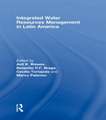 Preț: 203.68 lei
Preț: 203.68 lei - 25%
 Preț: 769.51 lei
Preț: 769.51 lei - 13%
 Preț: 297.79 lei
Preț: 297.79 lei - 26%
 Preț: 765.84 lei
Preț: 765.84 lei - 26%
 Preț: 763.39 lei
Preț: 763.39 lei - 22%
 Preț: 297.79 lei
Preț: 297.79 lei -
 Preț: 380.07 lei
Preț: 380.07 lei - 25%
 Preț: 823.17 lei
Preț: 823.17 lei - 16%
 Preț: 216.07 lei
Preț: 216.07 lei - 20%
 Preț: 178.76 lei
Preț: 178.76 lei - 26%
 Preț: 765.59 lei
Preț: 765.59 lei - 17%
 Preț: 184.11 lei
Preț: 184.11 lei - 16%
 Preț: 249.70 lei
Preț: 249.70 lei - 25%
 Preț: 523.97 lei
Preț: 523.97 lei - 17%
 Preț: 259.33 lei
Preț: 259.33 lei - 22%
 Preț: 308.65 lei
Preț: 308.65 lei - 26%
 Preț: 819.09 lei
Preț: 819.09 lei - 27%
 Preț: 994.26 lei
Preț: 994.26 lei - 26%
 Preț: 764.20 lei
Preț: 764.20 lei - 26%
 Preț: 764.85 lei
Preț: 764.85 lei - 23%
 Preț: 300.46 lei
Preț: 300.46 lei - 26%
 Preț: 765.40 lei
Preț: 765.40 lei -
 Preț: 381.59 lei
Preț: 381.59 lei
Preț: 416.22 lei
Nou
Puncte Express: 624
Preț estimativ în valută:
79.65€ • 82.85$ • 65.76£
79.65€ • 82.85$ • 65.76£
Carte tipărită la comandă
Livrare economică 15-29 aprilie
Preluare comenzi: 021 569.72.76
Specificații
ISBN-13: 9780367220464
ISBN-10: 0367220466
Pagini: 236
Dimensiuni: 174 x 246 x 13 mm
Greutate: 0.45 kg
Ediția:1
Editura: Taylor & Francis
Colecția Routledge
Seria Routledge Special Issues on Water Policy and Governance
Locul publicării:Oxford, United Kingdom
ISBN-10: 0367220466
Pagini: 236
Dimensiuni: 174 x 246 x 13 mm
Greutate: 0.45 kg
Ediția:1
Editura: Taylor & Francis
Colecția Routledge
Seria Routledge Special Issues on Water Policy and Governance
Locul publicării:Oxford, United Kingdom
Public țintă
PostgraduateCuprins
1. Introduction David B. Brooks, James E. Nickum, Anthony Turton and Surina Esterhuyse 2. Untying the Gordian Knot: unintended consequences of water policy for the gold mining industry in South Africa Anthony Turton 3. Mine site water-reporting practices, groundwater take and governance frameworks in the Hunter Valley coalfield, Australia Wendy Timms and Cameron Holley 4. Non-discrimination and liability for transboundary acid mine drainage pollution of South Africa’s rivers: could the UN Watercourses Convention open Pandora’s mine? Rémy Kinna 5. A pilot study of the Social Water Assessment Protocol in a mining region of Ghana Anastasia N. Danoucaras, Alidu Babatu Adam, Kathryn Sturman, Nina K. Collins and Alan Woodley 6. Unconventional oil and gas extraction in South Africa: water linkages within the population–environment–development nexus and its policy implications Surina Esterhuyse, Nola Redelinghuys and Marthie Kemp 7. Lessons from Yanacocha: assessing mining impacts on hydrological systems and water distribution in the Cajamarca region, Peru Diana Vela-Almeida, Froukje Kuijk, Guido Wyseure and Nicolas Kosoy 8. Disputes over land and water rights in gold mining: the case of Cerro de San Pedro, Mexico Didi Stoltenborg and Rutgerd Boelens 9. Mining and campesino engagement: an opportunity for integrated water resources management in Ancash, Peru Robert Patrick and Lalita Bharadwaj 10. Questioning the effectiveness of planned conflict resolution strategies in water disputes between rural communities and mining companies in Peru Milagros Sosa and Margreet Zwarteveen 11. Predicting water quality associated with land cover change in the Grootdrai Dam catchment, South Africa Anja du Plessis, Tertius Harmse and Fethi Ahmed 12. Assessing the existing knowledge base and opinions of decision makers on the regulation and monitoring of unconventional gas mining in South Africa Surina Esterhuyse, Marthie Kemp and Nola Redelinghuys
Descriere
The impact of mining is too big to ignore in a world of oversubscribed water. This is true of conventional mining as much as – or even more than – hydraulic fracturing (fracking). The chapters in this book were originally published in the journal Water International.
